Darryl F. Zanuck’s answer to MGM’s San Francisco (1936), 20th Century-Fox’s In Old Chicago (1937) rolls along as a very entertaining historical fiction for 70 full minutes before Mrs. O’Leary’s cow kicks and the final 25 minutes give way to Zanuck’s impressive version of The Great Chicago Fire of 1871. With flames surrounding our stars and buildings toppling onto (mostly) extras, someone just passing through the room might look quick and confuse the disaster portion of In Old Chicago for that of San Francisco.
If Zanuck had had his original way it would have been San Francisco’s own Gable pouring over the rubble of Old Chicago as well, but thankfully we have Tyrone Power seeking out his loved ones instead. I say thankfully not as a knock on Gable, I’m a big fan, but doing it twice would have cheapened both films, as it is we can kick back and enjoy them somewhat separately today. Had Gable been busy playing Dion O’Leary, Power may have found himself on MGM’s lot in what would eventually be the John Beal part in that studio’s Madame X (1937), which filmed at the same time. A trade had been worked out which would have swapped Power for that role in exchange for Jean Harlow playing what would become the Alice Faye part of Belle Fawcett in this film. Harlow’s tragic death on June 7th quashed that from happening.
Young Power had previously enjoyed a breakout role at 20th Century-Fox in another historical piece, Lloyd’s of London (1936), his first of eleven films which would be directed by Henry King–In Old Chicago is the second. While I’m a huge Power fan having previously reviewed Lloyd’s as well as Son of Fury (1942) and his final completed work, Witness for the Prosecution (1957), I actually chose In Old Chicago to write about at this time because of the presence of Alice Faye.
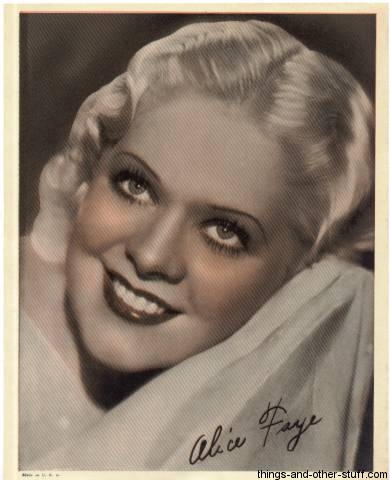
While not the best showcase of Faye, In Old Chicago does represent a big step forward in her career as well, but to get right down to it all that Netflix had available for Instant Viewing was this or Faye alongside Shirley Temple in Stowaway (1936), and I’m not quite ready to do that to myself yet. Alice Faye has grown on me from previous viewings of this film, plus Lillian Russell (1940), the wonderful Alexander’s Ragtime Band (1938) which elevated me to fan status, and finally the interesting non-musical Hollywood Cavalcade (1940), where Faye gets herself dirty in slapstick routines with Buster Keaton!
It was after Hollywood Cavalcade that I finally made the move to purchase the 2002 Faye biography by Jane Lenz Elder (I’m enjoying it more than the Amazon reviews had led me to believe I would) and now I find myself contemplating the two Alice Faye DVD Collections
as my next movie purchases … and, oh, Amazon is making it tough to resist by placing them both nearly 50% off as I type this!
Anyway, I’m on a bit of an Alice Faye kick. Having a hard time breaking my gaze away from those big eyes shown on Elder’s dust jacket, while her husky singing voice really got to me in Alexander’s Ragtime Band and I fell for her as the madcap in Hollywood Calvacade. In Old Chicago was enhanced for me this time around in paying special attention to Belle, but truth be told I was left wanting a little more. Faye sings three songs by my count and of course owns the spotlight when she does so, but at this point Fox seemed a little nervous about letting her do much of anything dramatic and so her presence never really matches up to Power’s in the rest of her scenes when they’re together.
Power, as is typical, owns his every scene through sheer star magnetism. What’s fun about his Dion O’Leary, especially in such an early role for Power, is that despite being the hero of the piece he’s by no means a good guy. Rascally and corrupt, Power’s Dion shines on his own mother and brother, outfoxes Brian Donlevy’s evil Gil Warren, so bad himself that he looks back fondly on his younger days of rounding up runaway slaves, but double-crossed so bad by Power that you still wind up feeling a little bad for him (just a very little), and finally after an early courtship that was more or less an example of successful stalking, Dion pulls his dirtiest trick on beautiful Belle. Dion crows so proudly over his twisted reasons for finally marrying her that his brother, Jack (Don Ameche), beats him bloody and we’re left to wonder how Belle could ever possibly forgive him.
As the focus of the story is on Dion, at least before that cow kicks, I suppose we’re supposed to think of him as rascally at worst, unfortunately by the time Ameche is knocking him around, Power’s character seems beyond redemption. But Ty Power is young and handsome and so full of bravado that I suppose the audience is as taken in as Ameche, Donlevy, Faye and all the rest by the time he’s able to resuscitate his character’s character, through the Great Fire of course, and so when the man who once callously told his brother “You’re mayor, but I’m Chicago. And I’d hate to have to kick you out,” departs from our screen as Chicago’s greatest hope for the future, we’re buying. In fact I’d have sat still for another 90 minutes just to see how this fictional Dion O’Leary brought the burnt out town back, but unfortunately, that film doesn’t exist.
Power and Faye weren’t the only young up and comers roaming 1870’s Chicago, Don Ameche plays Power’s virtuous brother, Jack O’Leary, in an early role which shows him off well. Jack’s a complete straight-shooter, a young lawyer and soon the reform candidate and, as I’ve already given away, eventual Mayor of Chicago. Jack’s rise to power from total unknown is executed through Dion’s backhanded behind the scenes dealings, methods entirely unknown to Jack … until Dion tells him! Even after he learns how he came to office Jack is level-headed enough to realize that the means don’t matter now that he has the power and sets about to reform Chicago, especially it’s main blight, the Patch, which is buoyed by The Senate, aka Dion and Belle’s Place, a haven for gambling and drinking. The brothers seem always set against one another with poor Jack doing the best he can by honest means while Dion will pull any trick he can to come out on top whether it’s his little bro beneath him or not.
Don Ameche had previously appeared with Power in Fox’s Ladies in Love a year earlier, while this was his first effort alongside Faye. The trio would be reunited the following year in Alexander’s Ragtime Band (1938), where they would find their roles more equal despite the obvious weight towards Power’s character. The year after that Ameche would play the title role in the biopic The Story of Alexander Graham Bell, enjoying billing over such heavy hitters as Loretta Young and Henry Fonda. While Tyrone Power and Alice Faye were much bigger Golden Age stars than Don Ameche was, Ameche’s career would outdistance them in length and he’d find himself the only one of the three receiving (or even nominated for) an Academy Award, which he took home for Support in 1985’s Cocoon.
Speaking of Academy Awards In Old Chicago would receive six nominations including Best Picture and would take home two awards with Robert D. Webb winning for Best Assistant Director and Alice Brady winning Best Supporting Actress for her role as Mrs. Molly O’Leary, Dion and Jack’s mother. The plum part of Mrs. O’Leary, at its meatiest during Brady’s scenes with Alice Faye, whose Belle did not meet with matriarchal approval for entrance into the O’Leary clan, came near the end for the versatile Brady, who died too young, just a few days shy of her 47th birthday in 1939.

Daughter of famed producer William A. Brady, who survived his daughter by over ten years, Alice Brady had her start in opera, singing the lead in several Gilbert and Sullivan operettas, before turning to the dramatic stage in 1912 as Meg in Little Women. It was busy times for Miss Brady in New York as she continued to play in both operettas and dramatic pieces on stage and then began to act on screen in films released by World Pictures, a company formed by Arthur Spiegel and Lewis J. Selznick with Alice’s father, William A. Brady, as head of production. Selznick was forced out of World in 1916 and the company would fold at Spiegel’s death in 1917. William A. Brady would return to the world of theater, and while Alice would remain busy on stage she’d also sign on with Selznick’s new company, Select Pictures Corporation, formed in partnership with Adolph Zukor of Famous Players, which would itself eventually become Paramount.
Alice Brady left film in 1923 at which point her career would have a pretty clear demarcation: she remained active on stage from 1923 through 1933 when she appeared in her final stage role, starring in Mademoiselle, a piece produced by her father and co-starring her step-mother, Grace George. Prior to Mademoiselle, in 1931, she had one of her greatest successes as Lavinia Mannion in Eugene O’Neill’s original production of Mourning Becomes Electra.
She would resume her film career out West that year in MGM’s first version of When Ladies Meet (1933) presiding over the triangle of Ann Harding, Robert Montgomery and Myrna Loy as Bridget Drake, the part later played by Spring Byington in the 1941 remake of the same name (I wonder if Brady would have been offered the part in the ’41 version had she survived). In 1934 she played Ginger Rogers’ Aunt Hortense in the Astaire-Rogers classic The Gay Divorcee and in 1936 she’d be the ditzy matriarch in the screwball classic My Man Godfrey, for which she received her first Academy Award nomination for Best Supporting Actress in 1937. Alice Brady was ill with cancer when she returned to New York for medical treatment after her final film, John Ford’s Young Mr. Lincoln (1939), completed filming. Of her return to New York the AP includes a recent quote in her obituary where Brady remarked, “Perhaps it’s for the best. Now I can do a Broadway play again.”
From opera to operetta, the stage to the screen, silent film to talkies and screwball comedies to weepy drama, Alice Brady was successful in just about every facet available for a performer of her time. Her Mrs. O’Leary in In Old Chicago was a feisty Irish mother of three who fought for her living running a laundry out of her home at the birth of Chicago. Her husband dies as the O’Leary’s arrive in 1854 and Molly O’Leary is left to raise boys Dion, Jack, and Bob (Tom Brown) all on her own. This fictional Mrs. O’Leary isn’t only owner of the cow who burns Chicago down, but mother to the two young go-getters, Jack, who seeks to reform Chicago and Dion, who capitalizes on its vice.
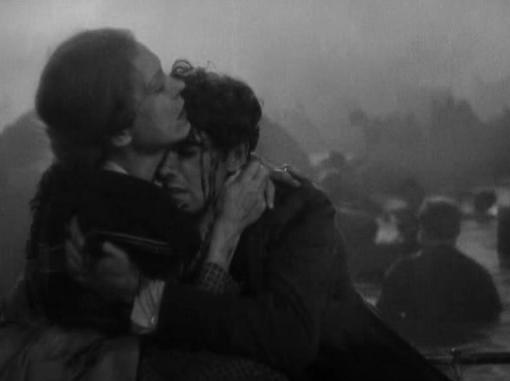
Alice Brady's Molly O'Leary comforts son Dion in In Old Chicago. Up above Brady is shown on what is probably a very early 1920's postcard promoting her while with Realart and below that to the right she is shown on a circa 1917 Kromo Gravure trading card in a photo probably taken at the time she was working for her father at World.
Youngest son Bob is contentedly married to presumably German Gretchen (June Storey), apparently just the type of girl Mrs. O’Leary would hope each of her sons would find, unlike Alice Faye’s Belle Fawcett, Dion’s business partner and lead attraction at their bar. While Dion moons “What a woman,” upon encountering Belle, the performer is too much the modern woman in his mother’s eye. Plied with beer and tricked into a carriage ride with Belle, Molly O’Leary isn’t shy about insulting the younger woman, hurting Belle and foiling Dion’s ploy of softening her stance. It takes the tragedy of the Great Fire itself for Mrs. O’Leary to find common ground with Belle through each woman’s love of Dion.
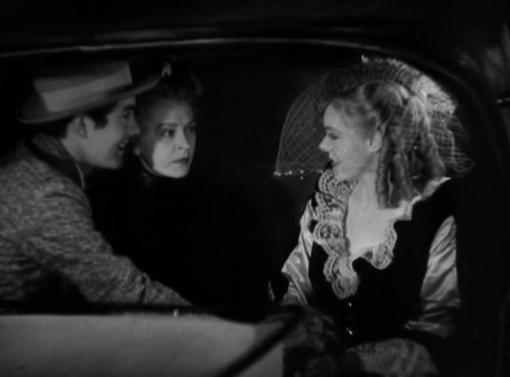
You can tell by Mrs. O'Leary's expression that she's not too thrilled with Dion's surprise introduction to Belle
The real star of In Old Chicago, the disaster itself, makes it’s long awaited entrance near the end of the film, but the story leading up to the half million dollar scene was more interesting that it’s usually credited as being. If you want history, rent a documentary, this is the movies and we’re rewarded with stories that usually have to break from the text books to hold the attention of a mass audience. That’s entertainment. And in its buildup to the Great Fire In Old Chicago did spin an interesting tale of 19th Century local politics whereby Dion acts behind the scenes to make his brother Mayor at the expense of local businessman Gil Warren (Donlevy).
Warren, the biggest man in town prior to the rise of the O’Leary boys, disappears for much of the film while newly elected Jack slowly but surely forces reform upon brother Dion’s part of town, the Patch. When the fire is said to originate from the O’Leary house Gil Warren reappears suggesting it was set on purpose by Jack to burn out the Patch. The idea makes just enough sense for Dion to seek answers from Jack while at his exit Warren riles up the locals a bit more by telling them Dion is likely in on this as well. Having done battle with the O’Leary’s before Warren knows Dion plays dirty and the rest of the townsfolk are more than willing to buy the idea that they’re in on burning out the Patch together. As the flames spread across Chicago the human element on the street turns ugly as well as Warren has his attempt at vengeance.
The romance between Dion and Belle takes a definite back seat to the action and political intrigue, but is necessary so that Zanuck can relive Gable’s search for Jeanette MacDonald through the rubble of San Francisco. Here we have Belle seeking Dion, Mrs. O’Leary seeking her family, Dion seeking Jack, and Dion seeking his mother, though honestly Dion doesn’t seem to be in such a hurry to find Belle, going so far as to ignore her during the touching scene where he finds Molly O’Leary–uh, Dion, Belle’s right there! Only after Dion sets things right with Molly O’Leary does he bother turning to Belle, leaving the romantic storyline the most unrewarding part of In Old Chicago.
In it’s whole however there is plenty going on and while the pre-disaster story may not be anything so special it is still a nice look to the past filled with strong performances by three young players who would soon be among 20th Century-Fox’s biggest stars. While Alice Faye contributes the least her songs justify her presence and her non-musical scenes give a hint of better things to come.


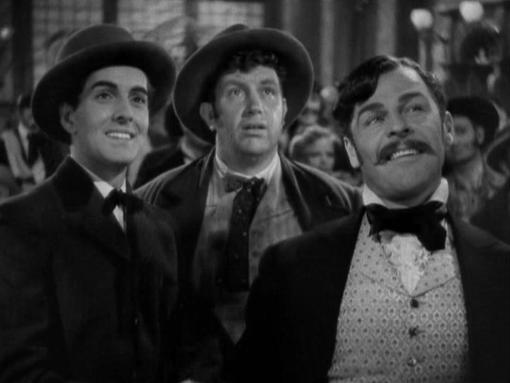




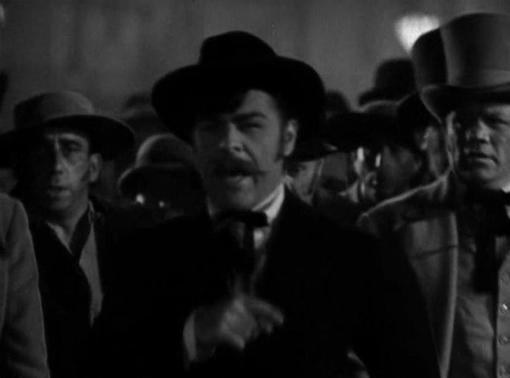


I LOVE THIS POST SO MUCH!
“In fact I’d have sat still for another 90 minutes just to see how this fictional Dion O’Leary brought the burnt out town back, but unfortunately, that film doesn’t exist.”
AHAHAHAHAH! Me too! Ty is just so amazing at playing charming jerks (which he did often, especially in his early career).
I mean, he even makes me believe that Jesse James is a great American patriot, up there with Lincoln and Washington! ;-D
Great post! I thoroughly enjoyed it!
Thanks, Millie! Oh, yes, he plays jerks, but wow, it was just cruel when he told his brother and brand new wife WHY he finally broke down and married her. I was kind of thinking somebody should punch this guy, and then Don Ameche did.
HAHAHAHAH!
Yeah.
And, seriously, when he starts laughing in that way that only Tyrone Power can– well, then I almost start to hate him.
But, not enough to be happy about Don Ameche beating him up.
;-D